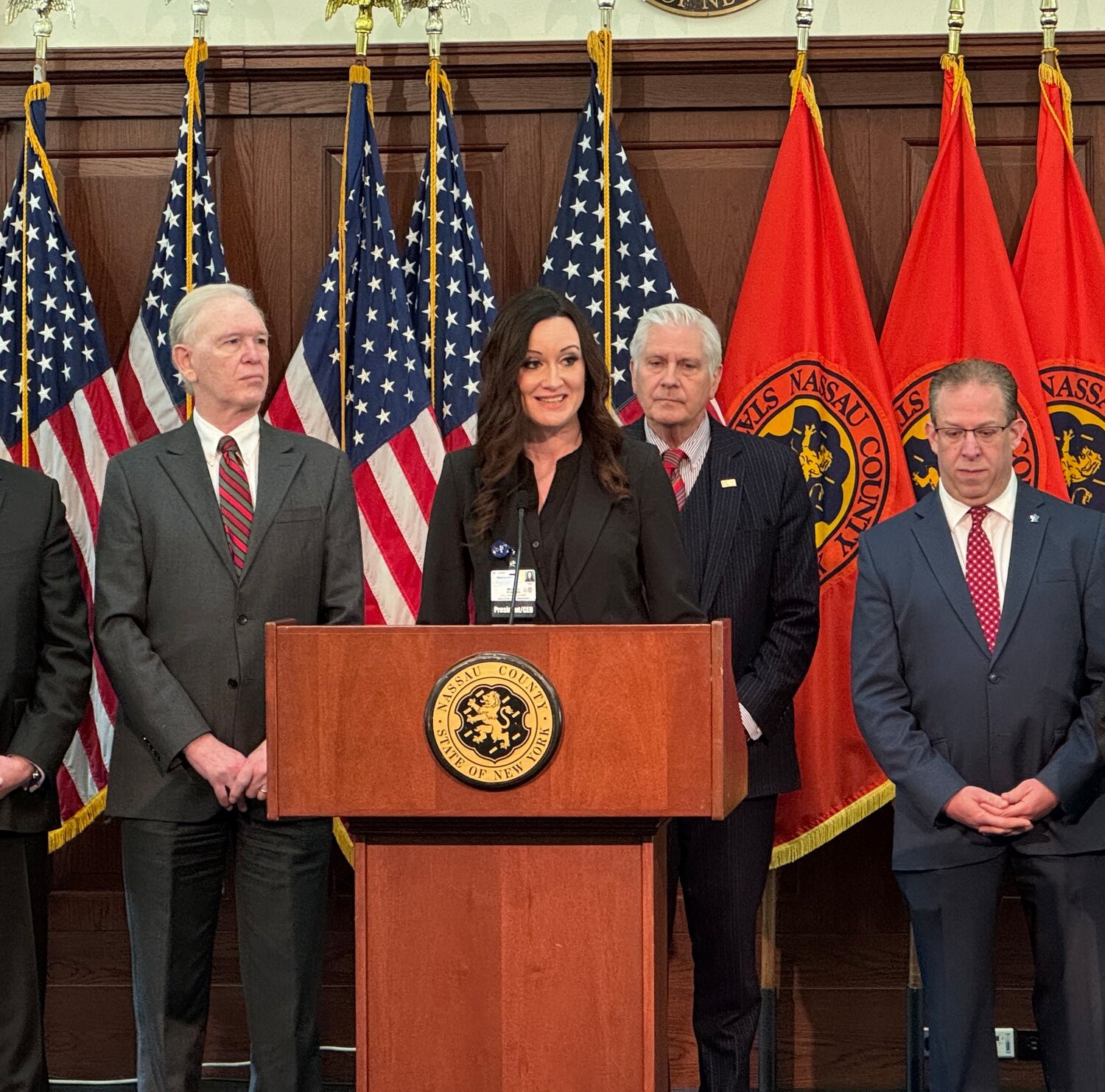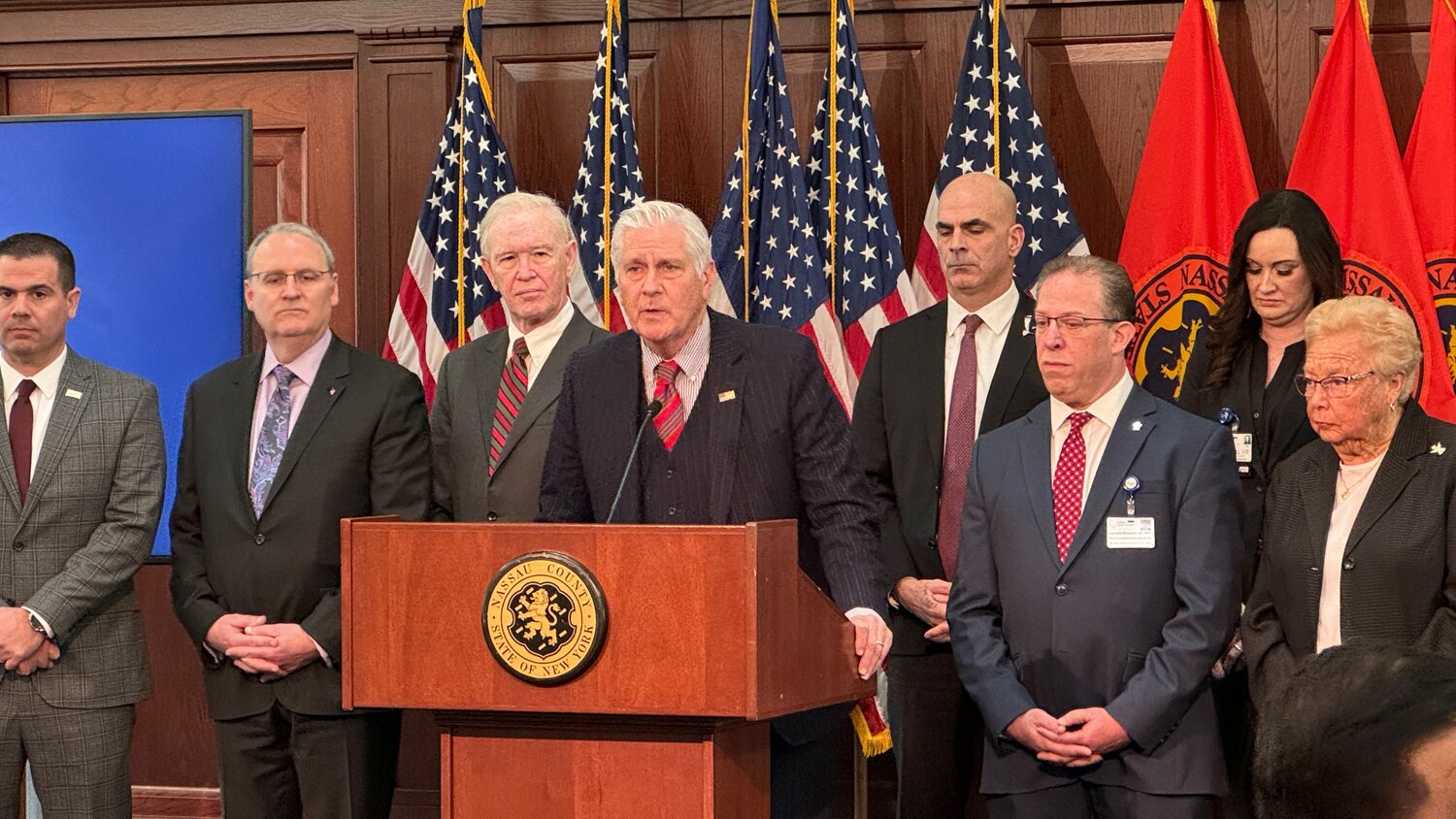Nassau University Medical Center to receive $2.5M to combat opioid epidemic
Joined by various health professionals and drug treatment organizations, Nassau County Executive Bruce Blakeman announced the allocation of $6.8 million for opioid use prevention, education and treatment on Feb. 5 in Mineola. The money will be distributed to health care providers across the county, as well as the Nassau County Police Department.
“Every years, tens of thousands of people die from fentanyl overdose, many of them young people,” Blakeman said.
Drug overdose deaths surged at the beginning of the coronavirus pandemic, hitting a record high by the end of 2020. Many health experts say the increase was fueled by fentanyl, a powerful synthetic opioid that is 50 times stronger than heroin.
Catholic Health Services, which is headquartered at Mercy Hospital in Rockville Centre, will receive $2 million, and the Nassau University Medical Center in East Meadow will receive $2.5 million. The police department is slated to receive $500,000, which will allow it to purchase state-of-the-art equipment to identify fentanyl on the street.
The county will also allocate $600,000 per year toward various education initiatives to inform the public about drug abuse and opioid addiction.
At its news conference on Monday, the county showed a recently recorded public service announcement featuring county Health Commissioner Dr. Irene Gelman and Anissa Moore, deputy commissioner of health and human services.
“These public service announcements will start off within the next couple of weeks,” Blakeman said, “which will give people in the community the opportunity to know where they can go for help, whether it’s treatment, counseling or any educational purpose.”
Dr. Larry Eisenstein, former county health commissioner and now the chief public and community health officer at Catholic Health, said the health care network was appreciative of the funding.
“We saw that the pandemic exacerbated what was a growing problem with regard to opioid use and mental health,” Eisenstein said. “One in four people in this country has a diagnosable mental health disorder.”
Catholic Health will embed primary-care physician offices with social workers and case managers to screen patients, and identify earlier those who may be suffering from substance abuse, Blakeman explained. Eisenstein said the money would be used to “build a center of excellence.”
“We’re going to be growing our operations — we’re going to be adding identifying navigators to our primary-care practice,” he said. “This is going to be serving Nassau County, based out of our hub at Mercy Hospital, with our new Family Health Center on the grounds of Mercy Hospital.”
Eisenstein emphasized that the services would be accessible to all. “We’re going to be making services available that if they don’t want to answer us on the spot, they know exactly where to go without barriers,” he said. “Catholic Health could not be more excited about this great opportunity — I cannot be more excited about it because preventative health has always been my life’s work.”
Blakeman said that the county is supplementing NUMC’s mental health facilities, where it also treats those struggling with substance abuse.
Meg Ryan, acting chief executive officer of NUMC, said the funds are “well needed.” The hospital plans to build outpatient rooms, bathrooms, counseling centers, conference rooms and nursing stations on its 10th floor, where there’s an inpatient mental health and addiction unit, and to expand facilities on its ground floor, by the emergency room, to treat patients struggling with substance abuse and mental health disorders, Ryan explained.
“Last year, we had 20,000 patients that went through NUMC for addiction services,” she said, “so with this money, we’ll be able to treat even more and help Nassau County.”
The county has received approximately $385 million in coronavirus relief money through the federal American Rescue Plan Act, and over $92 million in settlements form opioid manufactures, distributors and retailers.
County Legislator Delia DeReggi-Whitton, the minority caucus leader, said less than $7 million of that money has been spent. She called Monday’s announcement a “disappointment.”
“After two years of delays, the agencies that have been promised funding should have been paid in full, and a significant amount of additional funding should also have been released,” DeRiggi-Whitton said. “Neither have happened.
“To have just paid about one-seventh of our opioid funding more than two years later is an insult to every family that continues to struggle with the opioid epidemic,” she continued. “This money cannot be used for anything else other than addressing opioid addiction, and I feel Nassau must begin distributing this funding at a pace that meets the urgency of this crisis.”









